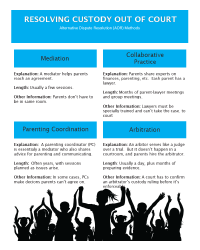CHILD CUSTODY ATTORNEY

The "best interests of the child" is a legal standard used in Michigan to determine custody, parenting time, and other matters involving children. The standard is based on the idea that children have a right to be raised in a safe, stable, and loving environment.
When making decisions about a child, the court will consider a number of factors, including:
- The love, affection, and other emotional ties existing between the child and each parent.
- The capacity and disposition of each parent to give the child love, affection, and guidance and to continue the education and raising of the child in his or her religion or creed, if any.
- The home, school, and community record of the child.
- The reasonable preference of the child, if the court considers the child to be old enough to express a preference.
- The physical and emotional health of the parents.
- The ability of each parent to provide for the child's physical and emotional needs.
- The stability of each parent's home environment.
- The willingness of each parent to cooperate with the other parent in raising the child.
- Any other factor that the court considers relevant to the child's best interests.
The court will weigh all of these factors and make a decision that it believes is in the best interests of the child. The court's decision is not always easy, and it is important to remember that the court is not trying to punish either parent. The court's goal is to make a decision that will allow the child to grow up in a safe, stable, and loving environment.
If you are involved in a child custody case, it is important to speak with an attorney as soon as possible. An attorney can help you understand the law and can represent you in court.
Physical Custody Where will your child live? What will be his/her everyday care arrangements? Physical custody will answer those questions. It includes the amount of time each parent can physically spend with his/her child. There are three physical-custody judgments: sole, primary, or joint custody. Sole custody means the child lives with only one parent. Sole-custody arrangements may be necessary if there is physical or emotional abuse and/or neglect toward the child from one parent. In a sole custody situation, the other parent may have visitation rights, which is determined by a judge. Primary custody means that the child lives with one parent most of the time. In Michigan, joint custody is the most common physical-custody arrangement. Sometimes joint custody is referred to as “shared custody.” It is the determination that the child equally shares time living with both parents. An example would be the child lives with one parent or the other on alternating weeks.
Legal CustodyThis refers to a parent’s right when making decisions for a child. These decisions can include a child’s health, education, religion, and general welfare. For instance, does a child attend public or religious school? Legal custody includes primary or joint custody arrangements of a child. Courts research and review each parents’ involvement in their child’s life. Sole legal custody makes one parent responsible for all decisions regarding his/her child’s life. Joint legal custody allows the parents to co-parent with regard to such decisions.
McCririe Law has over 40 years of experience helping parents navigate Child Custody cases. Going through a divorce is hard enough – having children involved gets more complicated. Hire attorneys with experience. Hire McCririe Law.
 The "best interests of the child" is a legal standard used in Michigan to determine custody, parenting time, and other matters involving children. The standard is based on the idea that children have a right to be raised in a safe, stable, and loving environment.
When making decisions about a child, the court will consider a number of factors, including:
The "best interests of the child" is a legal standard used in Michigan to determine custody, parenting time, and other matters involving children. The standard is based on the idea that children have a right to be raised in a safe, stable, and loving environment.
When making decisions about a child, the court will consider a number of factors, including: